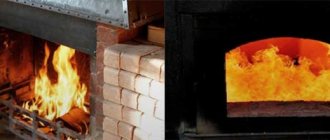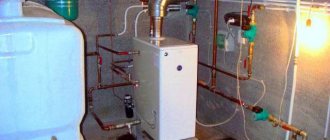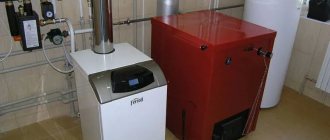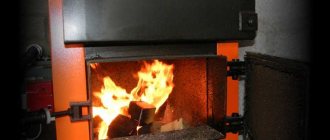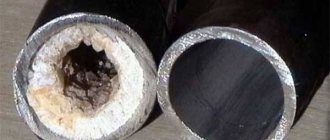Escaping from the bustle of the city, people try to buy or build a house away from civilization. But they are faced with the fact that often such remote places do not have a main gas pipeline and they have to look for ways that will ensure warmth and comfortable living in a country house. There are many options for heating a country house, but in this article we will answer the most important question that interests everyone without exception: what is the cheaper way to heat a house?
The following are the most popular types of fuel:
- The firewood is ordinary.
- Coal.
- Eurodrova.
- Electricity.
- Liquefied gas, in cylinders.
- Diesel fuel.
What kind of fuel will be appropriate in a particular building depends on the operating conditions of this building, the price of fuel and ease of use.
Conditions for choosing fuel:
- Fuel price.
- The price of the heating system and its installation.
- Heating system maintenance cost.
- Air temperature during the cold season in this region.
- Availability of communications.
- Possibility of fuel delivery.
- Purpose of the building: it is a place of permanent residence or a place of temporary residence for recreation or work.
- Presence of heat loss and degree of thermal insulation.
- Ease of operation of the heating and fuel system.
- Availability of a certain type of fuel in a given region.
To correctly select the most efficient type of fuel, it is necessary to carry out an appropriate calculation that will take into account the efficiency of a given heat source, heat loss, area and volume of the heated room.
All units of measurement must be reduced to a single denominator. It is most correct to use kilograms.
What fuel should you choose to heat your home?
This question is asked by every owner of suburban residential real estate today.
After all, the choice of fuel will determine what kind of boiler equipment you will install in your boiler room and whether it is necessary to do it at all, how profitable the use of this fuel will be and whether it will be freely available? With modern market development, you can choose a boiler using any of the fuels on the market today. But the more choice, the more doubts. And what is better to choose a boiler or fuel first? So, egg or chicken?
We recommend and insist that you start your choice with fuel!
The cheaper way to heat a house in Ukraine
Due to the increase in the price of firewood in 2022, the overall picture of the cost of heating in Ukraine looks very interesting. The layout is reflected in a similar calculation table:
Note. Electricity tariffs are indicated based on 2 conditions: the home has electric heating according to all the rules and energy consumption does not exceed 3000 kW/h per month.
The first place in terms of cheapness of heating in Ukraine is still occupied by dry firewood and electricity used at night. But due to the rise in price, their cost has practically become equal to the price of natural gas, which has fallen in price by 5...10% (in the current conditions it is not easy to announce the exact figure?).
Please also take into account this point: the table for 2022 shows average fuel prices. Pellets and briquettes of poorer quality can be bought cheaper, and electricity and gas cost the same everywhere. So, energy resources are arranged in the following order (from cheap to expensive):
- electricity at night tariff;
- main gas;
- dried firewood;
- pellets, sawdust briquettes;
- freshly cut wood;
- used oil;
- anthracite coal;
- electricity at a daily rate (for consumption up to 3600 kW/month);
- liquefied gas;
- diesel fuel.
It is impossible to predict the size of gas and electricity tariffs in Ukraine due to the unstable economic situation. It is unlikely that energy resources will become significantly cheaper; subsidy payments are decreasing annually.
On the issue of supplying main gas, Ukrainians are in the same position as Russians, whose houses are not connected to gas pipelines due to the high cost of the service. Both have to burn different types of solid fuel or use electricity at night.
To begin with, we will highlight the main criteria by which we will evaluate the selected fuel.
- The price for 1 kW of heat is the most important point for you
- Availability – the type of fuel you choose should not be a rare, scarce commodity
- Ease of storage – monthly or seasonal fuel needs can take up quite a lot of space, and some types of fuel also require special premises
- Efficiency of the heating boiler - the selected fuel should bring maximum benefit when burned in the boiler
- Automated supply - fuel supply to the boiler should be carried out automatically, without your participation
- Fire safety – the fuel you store must be fireproof. In this case, a low price cannot in any way be for the sake of safety.
- Environmental safety - there are still those who use fuel that pollutes the environment. But we and our descendants still have time to live on this planet!
Let's immediately exclude fuel oil and oil from candidates - it is unlikely that you will use fuel in your home that is used in large factories, industrial boiler houses or processing stations.
What are the costs of a heating system?
Many factors influence how much a particular heating method will cost. Only after calculating all the costs (it is also necessary to take into account the increase in fuel prices in the long term) can you decide on the most cost-effective heating method. To do this, you need to consider:
- Fuel cost;
- The cost of its delivery;
- Cost of heating equipment;
- The cost of its installation;
- Costs of its operation;
- Average monthly air temperature in winter;
- Method of living in the house: “dacha” mode or permanent residence;
- Availability of utilities connected to the site (gas, required electrical power);
- The degree of insulation and energy efficiency of the home.
When thinking about choosing a heating system and considering different heating options in the house, first of all you need to answer the question: not “how”, but “with what” you will heat your home. It is the type of fuel, its cost and availability that determines the cost of heating. season.
Let's consider the following situation: there is currently no main gas, as a more economically advantageous type of fuel, or its connection will be too expensive. What to do in this situation, what type of fuel to choose: firewood, liquefied gas, coal, pellets, fuel briquettes, electricity, even solar panels - there are a lot of options. Let's see which type of energy carrier is most preferable.
How to connect gas to a house is described in detail in this article.
The approach is usually the following: which energy carrier is most available in a region or a specific area is chosen. If there is a forest nearby, then they choose firewood. Coal mine - coal. We have access to cheap diesel fuel - we install a diesel boiler. There is no need to “sort through” all the possibilities and all the options for heating the house - we settle on the most affordable one.
This seems logical, but when choosing the most rational type of fuel, you need to think about how it will be used. It may turn out that the complexity of using fuel, the high cost of installing equipment, delivering and storing energy, outweigh the benefits of its use.
Heating options for a private home
Only by weighing the pros and cons and comparing several types of fuel can you come to a common denominator. No matter how cheap coal or firewood is, few people will be happy with the prospect of becoming a fireman (and coal is also constant dirt in the boiler room) or getting up in the middle of the night and throwing firewood into the firebox of a solid fuel boiler.
Pellet boilers (depending on the volume of the loading hopper) can operate for several days without the need for manual loading, but pellets are not common in all regions. Also, depending on the batch, their quality may be poor.
Such types of fuel as: pellets, firewood, coal, diesel fuel, liquefied gas require arrangement of storage space. In small areas it is difficult to find a place for a gas holder to organize heating of the house with gas; or a wood storage facility where you can stock up on fuel for the entire heating season, which lasts 6-8 months. The heating value of firewood or pellets can be significantly reduced if they become damp during storage.
Here we talk about all the possible heating options for a private home.
Such nuances have a significant impact on creating an economical heating system for a country house. Let's try to formulate the basic requirements for such a system. Cheap heating is:
- A system that uses the type of fuel available and convenient for you ;
- A system that is inexpensive to operate;
- A system that intelligently uses the received thermal energy (heat is accumulated due to the increased thermal inertia of the structural elements of the house). This could be a heated floor system, concrete screeds, USHP foundation, heat accumulators, etc.
To understand what advantages are inherent in the water heated floor system, we will turn for clarification to the head of the technical department of the “Engineering Systems” direction of the REHAU Sergei Bulkin, Moscow.
Sergei Bulkin
The water heated floor system can be used both as main and additional heating. It has a number of advantages over traditional radiators. Among them we can note - efficiency, ease of use, increased thermal comfort. Because water heated floors provide radiant heat, which is most comfortably perceived by the human body.
The heat emanating from the floor rises and is evenly distributed throughout the entire volume of the room. Therefore, the most favorable heating scheme for a person is created in the room - “feet are warm, but head is cold.”
The basis of such a system is a network of heating pipes (concreted in the floor screed) through which the coolant circulates - hot water or antifreeze (ethylene or propylene glycol). This system is not suitable for reconstruction in residential multi-apartment buildings with existing radiator wiring - its installation in them is prohibited by law. Since this leads to additional load on the floor from the heating screed and imbalance of the heating system of the house.
In order to get the maximum effect from a water heated floor system, its design must be carried out in advance, with individual reference to a specific house, and with mandatory thermal and engineering calculations.
Solar panels
This economical way to heat a room is the most innovative. The owner receives autonomy regardless of utilities.
There are few disadvantages. They are directly related to the climatic conditions in the region of residence. Such an economical heating method can provide a building with heat only in the south of the country, where the sun shines most of the time, and in winter there is a slight cooling.
In the central climate zone of Russia, the returns from using solar panels are decreasing. They can only be used as an additional source of heat. It will provide the house with approximately 50% heat. In addition, solar collectors themselves are expensive, ranging from $500 to $1,000 per unit. And to obtain the optimal amount of thermal energy, several such batteries are needed. You will also have to spend money on installation. But it's not worth saving. Thanks to professionals, you can avoid problems during installation and operation, and not damage expensive equipment.
Batteries can heat water to a maximum of 60 degrees. To increase efficiency in this regard, it is recommended to add a circulation pump to the system. At the same time, the storage tank should be changed periodically, and this is an extra expense that cannot be avoided. Due to this, the method ceases to be the most economical.
Batteries are suitable as an additional heating method. With them you can reduce heating costs, nothing more.
Modern economical technologies
With the help of modern technologies we can achieve the most economical home heating. But we still classify these technologies as unreasonable, because their payback period is quite long. From 10 years and above.
This technology includes a heat pump. With the help of earthly resources, it is capable of producing at least 4 times more energy than it consumes itself. If you need a boiler for your home with a power of 20 kW, then a heat pump with a power of only 5 kW will be suitable for heating. The heat pump runs on electricity. The pump also costs 3-4 times more than a first-class gas boiler with high efficiency.
Solar collectors can be used for heating. There is no energy consumption required at all. When properly installed, solar collectors can heat heated floors and provide you with the necessary amount of hot water. But again, it all comes down to finances.
Our future lies in these technologies. The moment will come when both a heat pump and a solar collector will become available to everyone.
As a result, we get that using a warm floor + temperature control + a heat pump (or collector) we can get truly the most economical home heating.
If you are looking far ahead and are confident that you can afford such expenses, then you definitely will not regret having all this installed at home.
Additional ways to save
Additional heating savings can be obtained by installing control equipment:
- If you have radiators, thermostatic heads will not be amiss. They are installed on the radiator supply instead of conventional valves. They perform a simple function - at the desired temperature in the room, they shut off the supply, and when the room cools down, they open it back up. The adjustment is only relevant for heating systems with forced circulation
- If you have heated floors, then it would be a good idea to install a manifold with servo drives and install a thermostat in each room. The servo drive is interfaced with the thermostat and when the required temperature in the room is reached, it shuts off the coolant supply to the heated floor circuit
These two life hacks allow you to achieve additional savings on heating.
Diesel boilers
This economical method is suitable for residents of those regions where inexpensive diesel fuel is available. Using a diesel boiler, you can heat buildings even in harsh winter conditions.
Features of this economical method:
- diesel boilers are expensive equipment;
- professional installation required;
- you need to allocate a separate room;
- installation must be carried out in accordance with safety conditions;
- Boilers require annual maintenance to ensure they remain efficient.
The system operates in a similar way to a car engine equipped with injection. As soon as the fuel supply is disrupted, heating costs automatically increase. Heating efficiency decreases.
An additional disadvantage is that the boiler pollutes the environment. This is comparable to the situation when a diesel truck is constantly operating on the site. The noise indicators from the diesel fuel boiler and from the operation of the burner are also significant.
The method is considered economical, but quite uncomfortable. If you correctly design a heating system using diesel boilers, the cost of heating will be comparable to using natural gas. If you make mistakes, heating costs will increase.
Steam boiler - what is it, features and principle of operation, where is it used? About all this in the link.
Electric Energy
Electricity is the most expensive, but also the most convenient type of fuel. The cost of electrical energy exceeds the price of gas by 7–8 times. But from a technical point of view, electricity can also be considered a leader in terms of comfort.
The operation of thermal electrical equipment is characterized by maximum efficiency - up to 99%. The following devices and complexes are used as heat sources:
- Boilers – heating elements, electrode, induction;
- Separate heating devices - convectors, oil radiators, fan heaters and others;
- Infrared heaters;
- Electric underfloor heating systems;
- Heaters for air heating systems.
The operation of electric heating has the following advantages:
- Absence of any waste and by-products - ash, soot, flue gases;
- High-quality temperature control;
- Low cost of boilers (but certain types of electric heating devices cannot boast of this);
- Easy to manage and operate.
Electric heat generators have 2 main disadvantages:
- High cost of electricity;
- Power engineers often lack free power and the quality of electrical wiring is poor.
Limitations on the power and cross-section of the supply cable prevent the installation of electrical equipment. The fact is that single-phase power supply allows the installation of a heat generator with a maximum power of 7 - 9 kW. This power may not be enough - then it will be necessary to install and connect a three-phase 380V power supply - and such a technical possibility is often not available.
They reduce heating costs with electricity (when using an electric boiler) by switching to a two-rate tariff and installing a heat accumulator. At a reduced tariff, heat is accumulated; when payment increases, the boiler is turned off and heat from the heat accumulator is used.
We heat with gas
Gas heating can rightly be considered more profitable if the gas pipe is located in close proximity to the house. To save on connecting to the highway, it is recommended to use the following rules:
- All services must be ordered in one place. This includes design, installation and subsequent service;
- It is necessary to properly prepare the place for the boiler;
- The boiler itself must correspond to the area of the house;
- You should choose the optimal size of the chimney.
The main advantage of gas heating is the low cost of energy. However, in essence, all the advantages end there.
Disadvantages of gas heating
- If the house was not initially connected to the gas main, then the initial connection costs are so high that not everyone can afford it. And if the owner of a house with a plot of land does not foresee income growth in the future, then you can safely install an electric boiler. And don’t worry about the difference in the cost of energy carriers;
- Do not forget that gas is a rather explosive substance. And here, inevitably, you will think again before installing gas heating in your house;
- A gas water heating system is inconvenient for short-term use and takes too long to warm up (when the house is used sporadically during the colder months).
